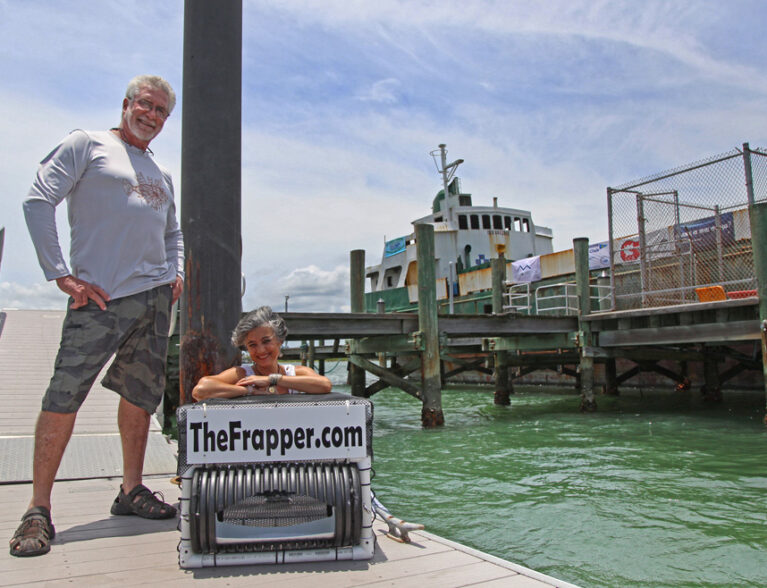
A first-of-its-kind Florida lionfish experiment meant to reduce the population of the voracious invasive species in local waters has failed due to vandalism and a lack of monitoring.
When the 180-foot freighter Voici Bernadette, a drug smuggling vessel seized in 2016 by U.S. Customs and Border Patrol, was sent 100 feet down to the ocean floor off St. Lucie County in June 2019, it carried a new name – the Curtis Bostick Artificial Reef – and four experimental lionfish attracting devices developed by Vero Beach scuba diving couple Bob and Maria Hickerson.
The rectangular, two-foot-wide, three-foot-deep PVC-and-mesh boxes called “Frappers” were secured to the deck of the sunken freighter to attract, but not trap, the peppermint-striped non-native fish from the Indo-Pacific.
Although lionfish are blamed for decimating native reef fish populations throughout Florida and the Caribbean, a lionfish trap would have violated state and federal bans on those devices in Atlantic and Gulf waters. Instead the Frappers were designed to lure lionfish into a small space where it would be easier to spear or net the destructive exotics while still allowing them – and any native species – to get out.
St. Lucie County artificial reef chief Jim Oppenborn had to get special permission from the Florida Fish and Wildlife Conservation Commission and U.S. Army Corps of Engineers to sink the ship with the Frappers aboard. Oppenborn said he expected the Hickersons and volunteer divers they recruited to monitor the devices regularly and document whether lionfish or natives used the Frappers.
Problem was, nobody conducted any monitoring of the Frappers for more than a year after the artificial reef was deployed: no fish counts; no photos or video; no documentation. And last August, when Maria Hickerson finally made her first dive on the site, she found two of the Frappers were missing, a third had been stripped of its entry, and the fourth was intact but empty.
Maria speared 14 lionfish that were hovering around the wreck during her dive, confirming the exotics had made a new home there.
Oppenborn is not at all happy with the situation.
“I thought there was a pretty good chance we’d get some info as far as lionfish are concerned and create a lionfish fishery here,” he said. “I didn’t get anything from Bob. He didn’t follow through. He had a hard time getting out there. He didn’t get divers out there. He did not do what he told me he would do. He should have sent me something, a simple email, ‘We weren’t able to get out there and monitor the thing.'”
Asked to respond, Bob Hickerson wrote in an email to Vero Beach 32963 that the couple had planned at least four dive trips to the shipwreck that got cancelled due to rough weather, and that Maria’s dive in August was their only visit. He wrote that his efforts to recruit other divers to monitor and report on lionfish went nowhere.
“Not a single one [responded] in writing. Very disappointing,” he wrote.
Hickerson added he believes whoever removed the Frappers “wanted to use them elsewhere for their own fish-trapping purposes. Whoever stole them had to really work to remove them or bring specialized tools.”
The Hickersons aren’t giving up on testing and improving the Frappers, but they have no plans to try to place any more of the devices in local waters. Bob wrote in an email that they are talking to a group in Aruba about testing them near the Dutch Caribbean island.







Comments: